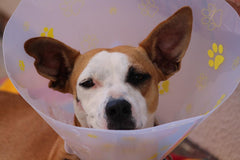
Have you ever noticed that there are some dogs that act like cats? It's not particularly common since dogs tend to be more loving and caring, but it's not unheard of either. Some dogs can seem aloof or less interested in their owners. Others will give off very cat-like vibes, coming over when they're hungry, rubbing up against you, and more.
If you have a cat-like dog, here are five reasons why you might be noticing this behavior now!
Dogs That Act Like Cats: You Have One of the Known "Cat-Like" Breeds

Some dogs are just naturally inclined to act more like cats! If you have a Basenji, Manchester Terrier, Italian Greyhound, Poodle, or a Shiba Inu, your dog might be more naturally cat-like than some of the other breeds.
Dogs from these breeds often lounge around the house like cats. They will sometimes even have very cat-like grooming behaviors, as well. There can also be an air of confidence to them, which you will find with many cats.
Therefore, rest assured that there is nothing wrong with your pet if you have one of these dogs. They might just be acting the way they should!
You Have Cats in the Home

Another reason you might have a "puppycat" around the house is that you have cats in the same home as your dogs. Dogs mimic behaviors that they see in humans and other animals.
Your dog could see your cat lying in the sun and think to themselves, "Hey, that would be fun too!" Or, your dog might watch your cat clean itself and think that might be a fun thing to try. While a dog might not think to do any of these on its own, it might get inspiration when it sees a cat doing something.
Naturally, the behaviors that each dog picks up on will vary. However, if you notice your dog starting to act like your cat, that could be the reason why!
You Have an Independent Dog

Some dogs are just naturally entirely independent creatures. This personality trait isn't the norm, but it's not altogether uncommon either.
Greyhounds, Basset Hounds, Maltese, and poodles can all be relatively independent dogs. That independence often appears very cat-like to their owners - especially if they have familiarity with felines.
If your dog naturally has an independent personality, there often isn't much you can do about it. Like humans, some dogs prefer more company, while others prefer less!
Your Dog Doesn't Like Petting or for You To Hold Them

One characteristic of cats is that some of them don't enjoy being touched or held. Many cats don't want their owners holding them. There is also limited research suggesting that some cats may not even like their owners petting them, so you should know how to properly pet a cat. Please note that many outlets widely misreported that study's results. However, if your cat feels uneasy, this study shows that your touch may not be reassuring but may add to their stress. This behavior is the opposite of what most people expect to see in dogs.
Some dogs, though, don't like to be held. For example, the Shiba Inu and the Chow Chow are low on the holding or affection scale. These natural characteristics might these breeds seem like dogs that act like cats!
You Have a Litter-Trained Dog

Yes, it is possible to litter-train your dog! Certain small dog breeds can use the litter box instead of needing to go outside. For example, a Yorkshire Terrier is a type of dog that some people have been able to train successfully.
Indoor training is beneficial for people who have smaller dogs and live in inclement weather. For example, it's hard to take your dog outside every day to use the bathroom when it's -20F outside! Plus, smaller dogs have smaller bladders, which means that you'll be going out in that nasty weather more often.
Of course, if you train your dog to use a litter box, don't be surprised when others say that you have a very cat-like dog!
Dogs That Act Like Cats: Most of the Time, It's Perfectly Normal

The vast majority of the time, if you notice a dog that looks like a cat, it's behaving entirely naturally. Certain breeds and personalities can make dogs appear to be more cat-like in general. If you have a dog that has always seemed more cat-like, there's almost undoubtedly no cause for concern.
However, with that said, if you notice a sudden behavioral shift in your pet and it is giving you cause for concern, please do not hesitate to take your canine friend to the vet. Some medical conditions can cause your once "dog-like" dog to appear very cat-like. An excellent example of this is when a dog has the instinct to be skittish like cats and hide when they feel sick. You might think to yourself that that feels more cat-like - and it is, but it's also a cause for concern in this particular circumstance.




